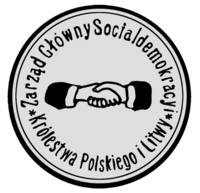Social Democracy of the Kingdom of Poland and Lithuania
|
Social Democracy of the Kingdom of Poland and Lithuania
Socjaldemokracja Królestwa Polskiego i Litwy |
|
|---|---|
 |
|
| Founded | 1893 (SDKP), 1899 (SDKPiL) |
| Dissolved | 1918 |
| Succeeded by | Communist Party of Poland |
| Membership | 40,000 (1906) |
| Ideology | Socialism, Marxism |
| International affiliation | Second International |
The Social Democracy of the Kingdom of Poland and Lithuania (Polish: Socjaldemokracja Królestwa Polskiego i Litwy, SDKPiL), originally the Social Democracy of the Kingdom of Poland (SDKP), was a Marxist political party founded in 1893. It later merged into the Communist Workers Party of Poland. Its most famous member was Rosa Luxemburg.
The leading cadre of the SDKPiL were a famous group, many of whom would play a role in the Russian Revolution of October 1917. Chief among them was Rosa Luxemburg, the leading theoretician of the movement. Other notable figures included Leo Jogiches, Julian Marchlewski, Adolf Warski, Felix Dzerzhinsky, Stanisław Pestkowski, Karl Sobelson, Józef Unszlicht, and Jakob Furstenberg. Internationalists to a fault, many of them would play leading roles in Germany as well as in Russia.
The party was founded in 1893 based on an internationalist Marxist program. At its core was the Union of Polish Workers which refused to back the national demands contained within the program of the Polish Socialist Party (PPS). As a result of the differing positions on the question of Polish national independence the former Union of Polish Workers and the Second Proletariat left the PPS in 1893 establishing the SDKP, differences between the two parties deepening at the International Socialist Congress of August 1893 when the All-Polish delegation, led by Ignacy Daszyński of Galicia opposed seating Karski and Rosa Luxemburg now making her first appearance at an international gathering. Differences were to deepen at the next International Socialist Congress in 1896 where Luxemburg was opposed by the future dictator of Poland, Józef Piłsudski, representing the PPS.
...
Wikipedia
